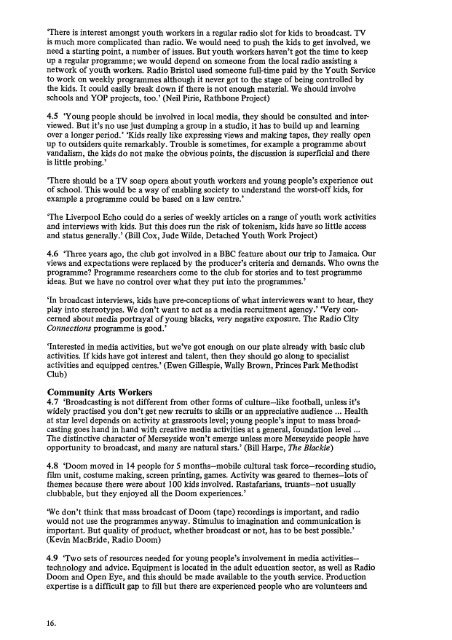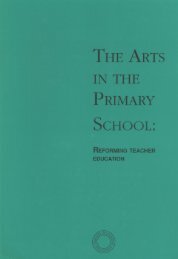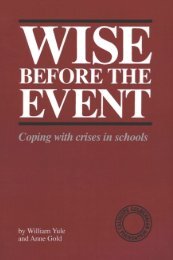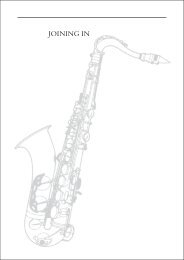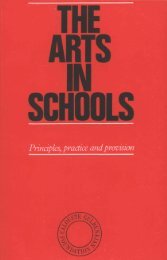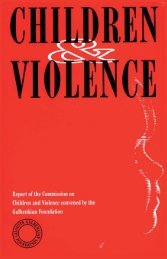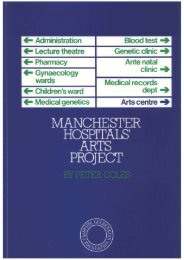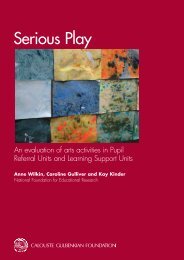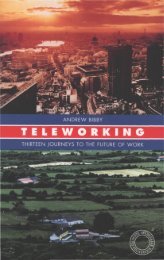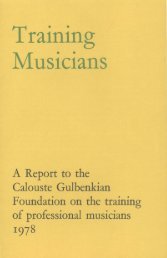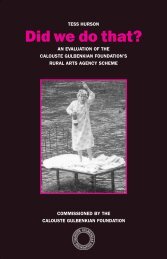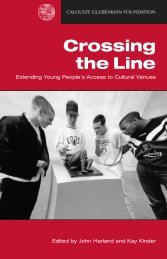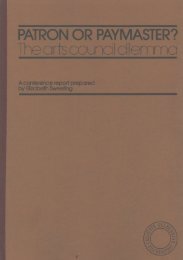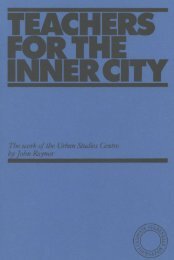Young People and Broadcasting - Calouste Gulbenkian Foundation
Young People and Broadcasting - Calouste Gulbenkian Foundation
Young People and Broadcasting - Calouste Gulbenkian Foundation
Create successful ePaper yourself
Turn your PDF publications into a flip-book with our unique Google optimized e-Paper software.
'There is interest amongst youth workers in a regular radio slot for kids to broadcast. TV<br />
is much more complicated than radio. We would need to push the kids to get involved, we<br />
need a starting point, a number of issues. But youth workers haven't got the time to keep<br />
up a regular programme; we would depend on someone from the local radio assisting a<br />
network of youth workers. Radio Bristol used someone full-time paid by the Youth Service<br />
to work on weekly programmes although it never got to the stage of being controlled by<br />
the kids. It could easily break down if there is not enough material. We should involve<br />
schools <strong>and</strong> YOP projects, too.' (Neil Pirie, Rathbone Project)<br />
4.5 '<strong>Young</strong> people should be involved in local media, they should be consulted <strong>and</strong> interviewed.<br />
But it's no use just dumping a group in a studio, it has to build up <strong>and</strong> learning<br />
over a longer period.' 'Kids really like expressing views <strong>and</strong> making tapes, they really open<br />
up to outsiders quite remarkably. Trouble is sometimes, for example a programme about<br />
v<strong>and</strong>alism, the kids do not make the obvious points, the discussion is superficial <strong>and</strong> there<br />
is little probing.'<br />
There should be a TV soap opera about youth workers <strong>and</strong> young people's experience out<br />
of school. This would be a way of enabling society to underst<strong>and</strong> the worst-off kids, for<br />
example a programme could be based on a law centre.'<br />
'The Liverpool Echo could do a series of weekly articles on a range of youth work activities<br />
<strong>and</strong> interviews with kids. But this does run the risk of tokenism, kids have so little access<br />
<strong>and</strong> status generally.' (Bill Cox, Jude Wilde, Detached Youth Work Project)<br />
4.6 'Three years ago, the club got involved in a BBC feature about our trip to Jamaica. Our<br />
views <strong>and</strong> expectations were replaced by the producer's criteria <strong>and</strong> dem<strong>and</strong>s. Who owns the<br />
programme? Programme researchers come to the club for stories <strong>and</strong> to test programme<br />
ideas. But we have no control over what they put into the programmes.'<br />
'In broadcast interviews, kids have pre-conceptions of what interviewers want to hear, they<br />
play into stereotypes. We don't want to act as a media recruitment agency.' 'Very concerned<br />
about media portrayal of young blacks, very negative exposure. The Radio City<br />
Connections programme is good.'<br />
'Interested in media activities, but we've got enough on our plate already with basic club<br />
activities. If kids have got interest <strong>and</strong> talent, then they should go along to specialist<br />
activities <strong>and</strong> equipped centres.' (Ewen Gillespie, Wally Brown, Princes Park Methodist<br />
Club)<br />
Community Arts Workers<br />
4.7 '<strong>Broadcasting</strong> is not different from other forms of culture—like football, unless it's<br />
widely practised you don't get new recruits to skills or an appreciative audience ... Health<br />
at star level depends on activity at grassroots level; young people's input to mass broadcasting<br />
goes h<strong>and</strong> in h<strong>and</strong> with creative media activities at a general, foundation level...<br />
The distinctive character of Merseyside won't emerge unless more Merseyside people have<br />
opportunity to broadcast, <strong>and</strong> many are natural stars.' (Bill Harpe, The Blackie)<br />
4.8 'Doom moved in 14 people for 5 months—mobile cultural task force—recording studio,<br />
film unit, costume making, screen printing, games. Activity was geared to themes—lots of<br />
themes because there were about 100 kids involved. Rastafarians, truants—not usually<br />
clubbable, but they enjoyed all the Doom experiences.'<br />
'We don't think that mass broadcast of Doom (tape) recordings is important, <strong>and</strong> radio<br />
would not use the programmes anyway. Stimulus to imagination <strong>and</strong> communication is<br />
important. But quality of product, whether broadcast or not, has to be best possible.'<br />
(Kevin MacBride, Radio Doom)<br />
4.9 Two sets of resources needed for young people's involvement in media activitiestechnology<br />
<strong>and</strong> advice. Equipment is located in the adult education sector, as well as Radio<br />
Doom <strong>and</strong> Open Eye, <strong>and</strong> this should be made available to the youth service. Production<br />
expertise is a difficult gap to fill but there are experienced people who are volunteers <strong>and</strong><br />
16.


